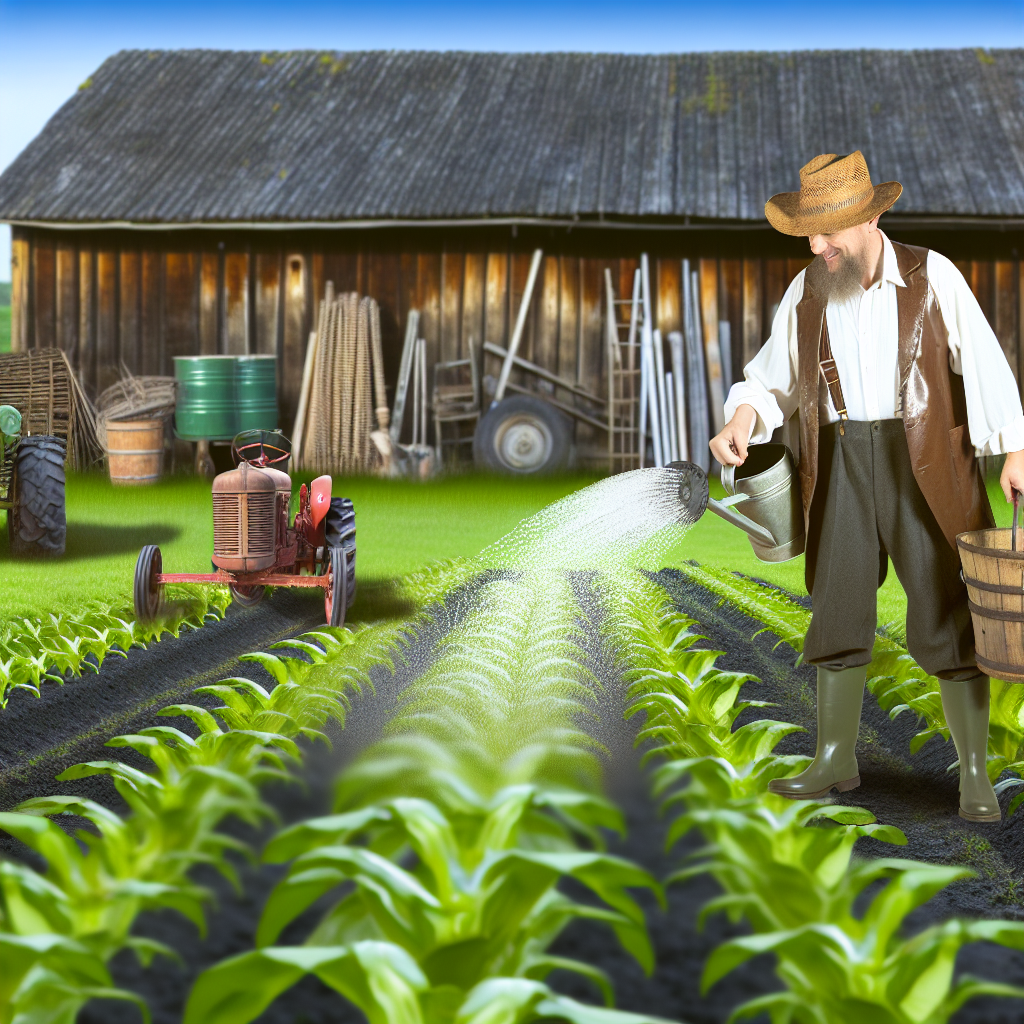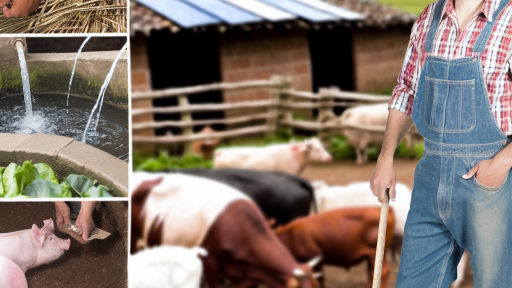Understanding the Basics of Organic Farming
Definition of Organic Farming
Organic farming emphasizes the use of natural processes.
It avoids synthetic fertilizers and pesticides.
This method promotes biodiversity in agricultural systems.
Core Principles of Organic Farming
Healthy soil is the foundation of organic farming.
Farmers prioritize soil fertility and health.
Crop rotation is vital to maintain soil health.
Additionally, organic farming encourages natural pest control.
This minimizes the need for chemical interventions.
Practices Employed in Organic Farming
Organic farmers use cover cropping to enrich soil.
They often practice intercropping to improve yield.
Furthermore, composting is a key practice to recycle nutrients.
Moreover, organic farms rely on natural fertilizers.
Benefits of Organic Farming
Organic farming enhances food quality and safety.
It creates a healthier ecosystem for wildlife.
Additionally, organic practices reduce pollution in water sources.
Transform Your Agribusiness
Unlock your farm's potential with expert advice tailored to your needs. Get actionable steps that drive real results.
Get StartedChallenges Faced by Organic Farmers
Organic farming can be labor-intensive and time-consuming.
Farmers often face economic challenges due to lower yields.
Additionally, they encounter pest and weed management issues.
Despite these challenges, many organic farmers find value in sustainable practices.
Benefits of Organic Techniques in Modern Agriculture
Environmental Advantages
Organic techniques significantly improve soil health.
These practices enhance biodiversity within agricultural ecosystems.
They reduce chemical runoff into waterways.
Additionally, organic farming methods lower carbon emissions.
As a result, they contribute to climate change mitigation.
Incorporating organic methods fosters natural pest control.
This reduces the need for synthetic pesticides.
Health Benefits
Organic farming produces healthier food options.
These foods typically contain fewer pesticide residues.
Studies show organic crops may have higher nutrient content.
Furthermore, organic techniques support animal welfare standards.
Animals raised on organic farms often lead healthier lives.
This contributes to better quality animal products.
Enhanced Community and Economic Impact
Organic farming supports local economies and communities.
It encourages farmers’ markets and local food systems.
As a result, consumers buy fresher produce.
Additionally, organic farms create jobs in rural areas.
This fosters a sense of community engagement.
Moreover, organic techniques improve food security.
They help diversify crops, reducing dependency on single crops.
Showcase Your Farming Business
Publish your professional farming services profile on our blog for a one-time fee of $200 and reach a dedicated audience of farmers and agribusiness owners.
Publish Your ProfileLong-term Sustainability
Organic methods promote long-term agricultural sustainability.
They encourage soil conservation and water management practices.
This makes farms more resilient to climate variability.
Additionally, organic farming practices restore ecosystems.
This preservation contributes to future agricultural productivity.
Ultimately, organic techniques align with sustainable development goals.
Key Organic Practices
Crop Rotation
Crop rotation improves soil health and fertility.
This technique reduces pests and diseases.
It also maximizes the use of nutrients in the soil.
Farmers can alternate different crops each season.
Such diversity in planting helps break pest cycles.
For instance, rotating legumes with cereals enhances nitrogen levels.
This practice not only boosts yield but also maintains soil structure.
Companion Planting
Companion planting involves growing different plants together.
This strategy enhances growth and pest control.
For example, planting marigolds with vegetables repels harmful insects.
Additionally, certain plants can improve nutrient absorption.
Some plants, like basil, enhance the flavor of tomatoes when grown nearby.
Farmers can create a mutually beneficial ecosystem through this practice.
Soil Health Management
Soil health management focuses on maintaining fertile soil.
This approach includes practices like cover cropping and mulching.
Cover crops prevent erosion and suppress weeds effectively.
Mulching retains moisture and adds organic matter over time.
Employing compost enriches soil nutrients naturally.
Healthy soil promotes robust plant growth and biodiversity.
Farmers must regularly test soil to understand its needs.
You Might Also Like: Connecting Farmers with Local Consumers Effectively
Integrating Technology: How Modern Tools Support Organic Farming Practices
Precision Agriculture
Precision agriculture utilizes technology to analyze and manage field variability.
This technique helps farmers maximize crop yields efficiently.
Moreover, it optimizes resource use like water and fertilizers.
Farmers can use drones for crop monitoring and assessments.
These drones collect valuable data on plant health and growth patterns.
Soil Health Monitoring
Maintaining soil health is crucial in organic farming.
Modern sensors can monitor soil moisture and nutrient levels in real-time.
This data helps farmers make informed irrigation and fertilization decisions.
As a result, they maintain optimal conditions for their crops.
Additionally, satellite imagery provides insights into soil composition and structure.
Automated Farming Equipment
Automation is transforming modern organic farming.
Robots can perform multiple tasks, such as planting and harvesting.
This technology minimizes human labor and increases efficiency.
Showcase Your Farming Business
Publish your professional farming services profile on our blog for a one-time fee of $200 and reach a dedicated audience of farmers and agribusiness owners.
Publish Your ProfileFor example, autonomous tractors use GPS for precise navigation.
These advancements reduce operational costs for farmers.
Data Analysis and Management
Data analysis tools help farmers make strategic decisions.
They can track crop performance and market trends effectively.
Advanced software programs analyze historical data for future planning.
This approach enhances yield predictions and financial planning.
Farmers can also share insights with local communities to improve practices.
Eco-Friendly Pest Management
Integrated pest management combines traditional and modern techniques.
Biological controls use natural predators to manage pest populations.
Farmers can also apply targeted treatments using drones or sensors.
This reduces the need for harmful pesticides while protecting crops.
Furthermore, mobile applications offer farmers guidance on pest identification.
Delve into the Subject: Climate Resilience In Sustainable Agricultural Practices
Challenges of Implementing Organic Techniques
Common Obstacles
Transitioning to organic methods can pose significant challenges.
One major obstacle is the higher initial investment costs.
Farmers may struggle to afford organic inputs and certifications.
Another challenge involves knowledge gaps in organic practices.
Some farmers lack training in sustainable farming techniques.
Pest management also becomes more complicated organically.
Conventional methods often rely on chemical controls.
Organic practices require more labor-intensive solutions.
Additionally, crop yield fluctuations can cause concern.
Farmers may experience lower yields during the transition phase.
Market access can also limit organic farming success.
Strategies to Overcome Challenges
Several strategies can help farmers navigate these challenges.
First, they can access financial assistance programs.
Government grants and subsidies support organic transitions.
Secondly, education and training programs can close knowledge gaps.
Organizations like the Sustainable Agriculture Research and Education (SARE) offer resources.
Networking with experienced organic farmers can provide mentorship opportunities.
Adopting integrated pest management practices can simplify pest controls.
Crop rotation and biodiversity enhance resilience against pests.
Communities can also establish local farmer cooperatives.
Cooperatives help farmers share resources and market their products together.
Lastly, farmers should focus on building consumer relationships.
Direct sales through farmers’ markets strengthen community ties.
Engaging customers through social media can raise awareness of organic products.
Gain More Insights: How Farms Supply Fresh Produce to Schools

Regulatory Standards for Organic Farming
Overview of Organic Standards
Organic farming adheres to specific regulatory standards.
These standards aim to promote sustainability and environmental health.
Showcase Your Farming Business
Publish your professional farming services profile on our blog for a one-time fee of $200 and reach a dedicated audience of farmers and agribusiness owners.
Publish Your ProfileCompliance ensures the integrity of organic produce.
Farmers must understand these regulations to maintain certifications.
Certification Process
The organic certification process can be complex.
Farmers need to choose an accredited certifying agent.
They should complete an application detailing their farming practices.
Documentation is vital for verification of organic practices.
Annual inspections ensure ongoing compliance with organic standards.
Key Regulations to Consider
Understanding key regulations is essential for organic farmers.
- Comply with the USDA National Organic Program (NOP) requirements.
- Utilize approved organic inputs for pest and disease management.
- Maintain meticulous records of all agricultural practices.
Adhering to these regulations benefits both farmers and consumers.
Importance of Traceability
Traceability is a crucial aspect of organic farming.
It ensures transparency within the supply chain.
Farmers must track all organic products from farm to market.
This practice builds consumer trust in organic certification.
Staying Updated with Changes
Organic regulations can change frequently.
Farmers should regularly review updates from regulatory bodies.
Networking with other organic farmers can also provide valuable insights.
Staying informed supports continued compliance and market access.
See Related Content: Educational Benefits of Farm-to-School Initiatives
Success Stories: Case Studies of Farms Successfully Implementing Organic Techniques
Green Valley Farms
Green Valley Farms transformed its methods over the last decade.
They adopted crop rotation and cover cropping strategies.
These techniques improved soil health and increased biodiversity.
As a result, their crop yields increased significantly.
Moreover, they reduced reliance on chemical fertilizers and pesticides.
The farm has become a model for local farmers.
Sunny Acres Organic Farm
Sunny Acres Organic Farm began its organic journey three years ago.
The owners implemented integrated pest management practices.
They introduced beneficial insects to control pests naturally.
Customer demand for organic produce rose sharply.
Consequently, their sales and profitability improved drastically.
This success inspired neighboring farms to follow suit.
Harvest Moon Farm
Harvest Moon Farm has embraced agroforestry practices.
This integration of trees and crops has multiple benefits.
The farm enhanced carbon sequestration and soil fertility.
Consequently, they witnessed increased resilience against climate variability.
Their innovative approach gained recognition in local markets.
As a result, they have attracted eco-conscious consumers.
Willow Creek Farms
Willow Creek Farms set out to reduce water usage.
They implemented rainwater harvesting and drip irrigation systems.
These systems optimized water efficiency significantly.
The farm now serves as a training site for other farmers.
Showcase Your Farming Business
Publish your professional farming services profile on our blog for a one-time fee of $200 and reach a dedicated audience of farmers and agribusiness owners.
Publish Your ProfileMoreover, they promote water conservation practices throughout the community.
This commitment has furthered their environmental stewardship reputation.
Maple Grove Community Farm
Maple Grove Community Farm focuses on educating local youth.
They run workshops on organic farming techniques and sustainability.
This initiative fosters a new generation of environmentally conscious farmers.
The community benefits from increased awareness about organic practices.
Additionally, they have cultivated a strong support network.
This network promotes local organic produce and sustainable farming methods.
Future Trends in Organic Farming
Innovations Transforming the Industry
Technological advancements are shaping organic farming practices.
Precision agriculture tools improve crop management significantly.
Farmers now utilize drones for monitoring crop health efficiently.
Biotechnology helps in developing disease-resistant plant varieties.
These innovations enhance productivity while maintaining sustainability.
Consumer Demand for Organic Products
Consumer interest in organic products continues to grow rapidly.
Health consciousness drives more people towards organic food choices.
Moreover, consumers seek transparency in sourcing and production.
This trend encourages farmers to adopt organic practices.
Retailers are responding by expanding organic product offerings.
Sustainable Practices in Organic Farming
Crop rotation remains a fundamental technique in organic farming.
It enriches soil health and prevents pest buildup effectively.
Cover cropping also enhances soil fertility naturally.
Additionally, integrated pest management reduces chemical usage.
These methods collectively lead to sustainable farming solutions.
Regulations and Certifications Impacting Farmers
Regulatory frameworks shape the organic farming landscape considerably.
Farmers must comply with stringent certification processes.
This involves proving their organic practices consistently.
Government initiatives support organic farming through grants and subsidies.
These measures encourage more farmers to transition to organic methods.




